Do you buy organic food?
There is no right or wrong answer here! Both are correct, and the yes or no answer depends widely on you, your situation, and your family.
The reason I ask is because this is a big subject, and can be a touchy one. So I thought I’d take a look at organic foods, what things you might want to consider, and where to start.
You might be asking yourself “why is a person who focuses mainly on sleep talking about organic food?” and that’s a valid question. The answer is that our sleep, our health, and our energy depend on a lot of things, including the food we eat! Choosing the best foods for you can go a really long way to improving your sleep and your energy.
FYI – I did a specific post/video on organic meat, because that deserves its own focus.
But let’s dive into the fruit & veggie side of things!
What Does Organic Mean?
Organic food means food grown in a way that it sustains the health of the soil, is based on living ecological systems, and the primary focus is to protect the health and well-being of future generations.
Practically, this means that organic food has strict restrictions around using pesticides, synthetic fertilizers, drugs or antibiotics, genetically modified organisms (GMOs), and artificial flavours/colours/etc.
Is Organic Food Regulated?
In Canada “organic” is a regulated term. In order to be certified organic, there are a lot of criteria that a farm/grower has to meet and keep up with.
Any food coming into Canada has to meet Canadian organic requirements, and Canada, the United States, and the European Union all have equivalent requirements.
To tell if something is actually organic, you’ll want to look for the Canadian Organic logo, the USDA Organic logo, or the EU organic logo
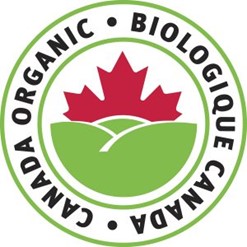
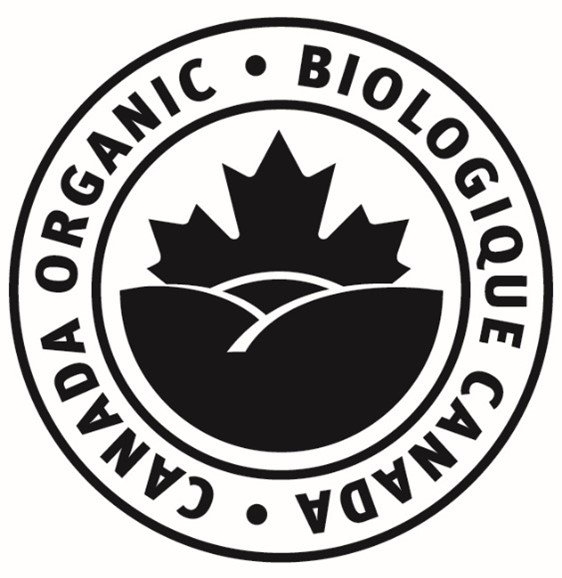
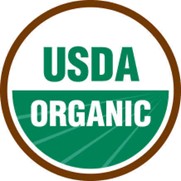

But! It isn’t mandatory to label food with the organic label, so sometimes you might find food that is organic but not labeled as such.
Is There A Difference In Quality?
Studies comparing the nutrition between organic and non-organic produce are generally inconclusive. There does not seem to be much difference in the availability of vitamins and minerals between organic and non-organic fruits and vegetables.
That doesn’t mean organic food isn’t good for you. But there are a few things you need to think about.
Organic Vs. Local
I think the question of organic vs local is worth a discussion.
Again, there is no right answer to this question.
Organic food does reduce your exposure to pesticides, fertilizers, and additives. It can also taste better than non-organic food. But organic food can be quite a bit more expensive than non-organic food.
Whether you’re eating organic food or not, there’s a good chance that much of your food in the winter comes from very far away. Food that travels from South America or South Africa to North America is picked before its ripe in order to avoid it rotting while it’s in transit. But the longer fruits or veggies ripen on the vine, the more nutrition they have (and the better they taste). Sometimes food that is available locally, whether it’s organic or not, might have more nutrition than strictly organic food.
It can be almost impossible to get fresh fruits or veggies in the winter. Focusing on local foods that can be stored over the winter, like carrots, potatoes, squash, and cabbage, is a good way to eat locally in the winter. Or choosing frozen food that is produced more locally (bonus points if it’s organic) is a great option in the winter as well.
Another thing to consider for local vs organic might be the environmental impact of your food. Transporting food around the world might be a factor in your decision making as well as this is a significant output of carbon.
At the end of the day, you want to aim for 6-8 servings of fruit and veggies each day. If the cost of organic food prohibits that, then you might want to rethink 100% organic. But if you are interested in going organic, the Dirty Dozen is a good place to start.
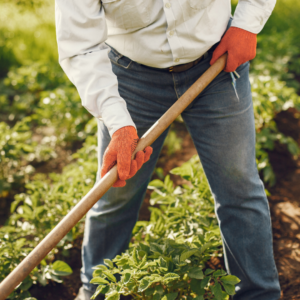
Dirty Dozen & Clean Fifteen
Every year the Environmental Working Group (EWG) publishes their list of the dirty dozen (https://www.ewg.org/foodnews/dirty-dozen.php). The food on this list typically carry the most pesticide residue. If you’d like to start thinking about organics, or at least do a few veggies/fruits organic, this is definitely the best place to start.
The EWG also puts out a list every year of their Clean 15. These are the 15 foods that tend to carry a lower pesticide residue on them, so you don’t need to be as concerned about buying organic.
Both of these lists get updated annually, although many of the same foods stay on them, so make sure to check in with each list every year!
Additives
Organic food is not allowed to contain any additives or chemicals. This is kind of silly when it comes to picking fruits and veggies – they don’t have additives. But it does come into play when you’re choosing packaged or prepared food.
So should you choose organic packaged food? Again, it depends. Let’s say you have the option to buy Kraft Dinner or an organic Mac & Cheese. Should you pay extra for the organic version? The organic version will mean that they might make their cheese the bright yellow colour with turmeric instead of chemicals, and this might be incredibly important. But at the end of the day, from a broader nutritional perspective, they’re both macaroni and cheese.
I challenge you to consider the entire nutritional perspective of these foods before you let a label or a word make the decision for you.
Limitations of Organic
Like everything, there are limitations to organic food. It can be extremely difficult and expensive to get (and maintain) organic certification. Larger farms sometimes have more access to this, but smaller family farms might have a harder time getting this certification.
Supporting local farms, especially when there is a lot of produce in season, is a great way to eat when you can. Have a conversation with your local farmer to talk to them about their approach to organic, their growing practices, and how they work. Most farmers will be so happy to talk about their process!
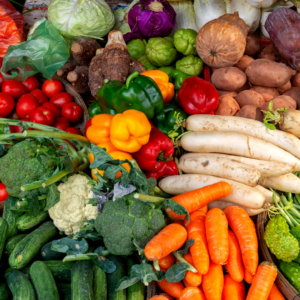
At the end of the day, there is no right or wrong answer when it comes to organics. The things you have to consider for yourself and/or your family include:
- Exposure to pesticides, additives, etc.
- Cost
- Taste
- Availability
- Transportation
I hope this helps you make some more sense of what organic food is, and what you need to consider when making a decision about organics.
Head on over to my YouTube channel to check out the video I did on this subject, as well as the things to think about when considering organic meat.
